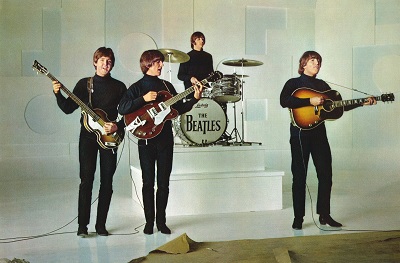
HaederleZTake
Copyright Infringement
"Are These Your Tunes? Mind If I Take One?"
Column by Jim Haederle (5/12/22)
It happens at odd moments, usually when Iím doing something mindless. Iíll be humming a favorite song as I tie my shoe, and suddenly the melody will remind me of another song.
Maybe itís my obsessive nature, but I canít not notice melodic similarities. Driving home from a wedding one December night, it occurred to me that the first four notes of "Here Comes The Bride" and "Oh, Christmas Tree" are identical. They donít sound identical because they start on different beats, but sing either song acapella, just the first four notes, and youíll see what I mean.
Such similarities abound in popular music, hiding in plain sight.
The "Nationwide is on your side" jingle, (introduced in 1977 and composed by J.D. Miller) is not unlike the melody to The Beatlesí 1963 song "Misery".
The first and second measure of Christopher Crossís "Arthurís Theme (The Best That You Can Do)" reminds me of the "You know you canít hold me forever" line from Elton Johnís "Goodbye Yellow Brick Road", while the third and fourth measure of that same verse could be the refrain from the Mary Tyler Moore Show intro, both tunes written years before Crossís 1981 mega-hit.
The melodic structure of Yesís "And You And I" (1972) and "Benny The Bouncer" (recorded by Emerson, Lake and Palmer in 1973) are both reminiscent of "How To Handle A Woman" from the 1960 Broadway show Camelot, each melody comprised of ascending fourth intervals
Composers recycle their own music all the time. Thatís what constitutes a style, for better or worse. One could argue that Jeff Lynne and Bruce Springsteen have been rewriting the same song for their entire careers, but their fans find comfort in
predictability. Where composers may run into trouble is when a discernible section or the entirety of a song is blatantly similar to something else.
When Pink Floydís Roger Waters first heard Andrew Lloyd Webberís 1986 musical Phantom Of The Opera, he was shocked to notice that the ominous opening organ theme was lifted hook, line and sinker from a segment of his 1971 song, "Echoes". Waters believed he had a solid case to take legal action, but ultimately decided it wasnít worth the trouble.
Hollywood director Stanley Donen, weighing in on the script-in-progress for his 1952 musical Singing In The Rain, suggested to songwriters Nacio Herb Brown and Arthur Freed that a certain scene could use a song Ďlikeí Cole Porterís "Be A Clown" from the 1948 musical The Pirate. The composers took his directive to heart and offered up "Make ĎEm Laugh", a song so obviously derivative of "Be A Clown" that classic film buffs still confuse the two. Cole Porter, like Roger Waters, was offended by the thievery but chose not to sue.
But some do not take plagiarism lying down. Former Beatle George Harrison found this out the hard way in February 1971, when Bright Tunes Music Corporation-holders of the copyright to composer Ronnie Mackís hit for The Chiffons, "Heís So Fine"-filed suit against him, believing that his 1970 smash "My Sweet Lord" was more than a little imitative of Mackís 1963 composition. The court found Harrison to have engaged in "subconscious plagiarism" (he did admit to being familiar with The Chiffonsí catchy single) and he had to pay out over a half million dollars in damages.
1963 was a banner year from which ex-Beatles could plunder inspiration. The anonymous composer of "Stewball," an obscure 18th century folk ballad, could hardly have imagined that his melody would someday reemerge in part as John Lennonís 1971 holiday classic, "Happy Xmas (War Is Over)". But how was Lennon exposed to that melody? Likely from hearing Peter, Paul and Maryís 1963 treatment of "Stewball".
There are ultimately only so many notes in the scales of Western music, and youíd think itís next to impossible to write a fresh melody nowadays. But I still occasionally hear stuff on adult alternative radio that sounds totally original and surprisingly innovative, composed by artists who refuse to resort to clichť. These songs, of course, are far too clever for mainstream airplay, where skating on the slippery edge of plagiarism is almost the rule.
But itís nice to know that the essence of John Lennonís public comment on George Harrisonís legal woes ("He couldíve changed a couple bars in that song and nobody couldíve ever touched him") resonates with at least some contemporary songwriters. If youíve written something that sounds a tad too familiar for comfort, just change a few notes and you can call it your own.
Jim Haederle is a father, freelance writer, songwriter, singer/keyboardist with "The Force," actor, cartoonist, presidential history buff, and can name every James Bond movie in chronological order.
©2022 Roger Zee


